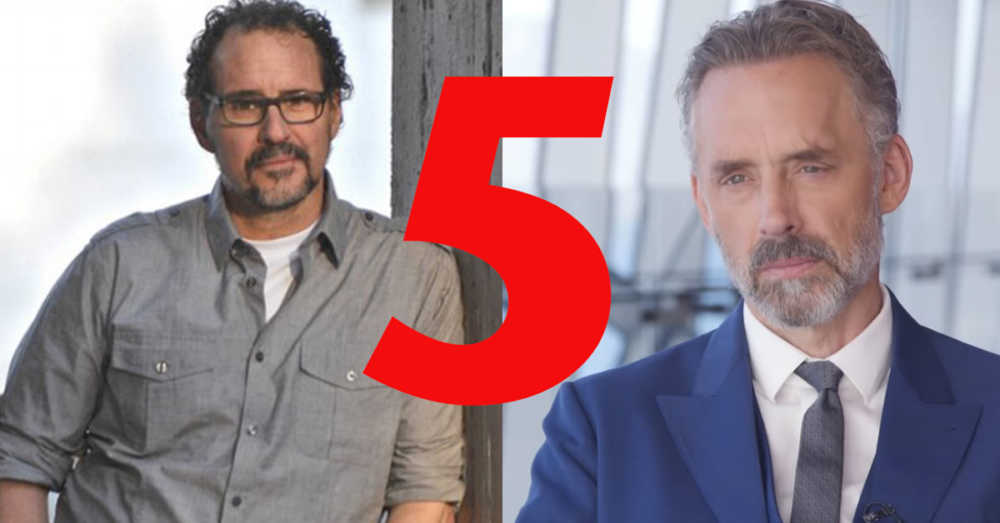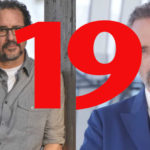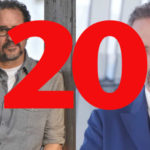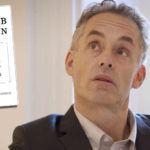We run our website the way we wished the whole internet worked: we provide high quality original content with no ads. We are funded solely by your direct support. Please consider supporting this project.

Part 5 (of 15): The Delicate Dance
Assessing Jordan Peterson’s 12 Rules for Life
by Greg Boyd
“We eternally inhabit order, surrounded by chaos.
We eternally occupy known territory, surrounded by the unknown.”
Nowhere in 12 Rules of Life (or anywhere else that I know of) does Peterson bring together the various aspects of his multifaceted philosophy to demonstrate how they form a coherent system. Nor has anyone else done this on Peterson’s behalf, so far as I know. Yet, you cannot fully understand, let alone fully appreciate, why Peterson arrives at the controversial social stances he espouses without first understanding the systematic structure of his thought. And this is why I am dedicating the first part of this series on Peterson to organizing his ideas into a coherent philosophical system, starting with what I consider to be his most foundational convictions.
Thus far we have seen that Peterson is convinced that suffering is inherent in the very concept of Being, for to exist is to exist as a limited, vulnerable, finite thing (see part two). We’ve also seen that the persistent suffering that comes with existence, which often can feel unbearable, can all-too-easily lead a person down a hellish road of resentment and despair, to the point that they conclude that “it would be better if Being itself didn’t exist.” And this despair, in turn, can cause a person to come to the point that they hate existence and contemplate “suicide,” or even “genocide, or worse” (346) (though I admit it’s not clear to me what could be “worse” than genocide). Moreover, what holds true for individuals holds true for all groups of individuals – viz. all societies.
According to Peterson, the only thing that can prevent individuals and societies from descending down this road to hell is for each individual to choose to believe in the essential goodness of reality, or “Being itself,” which Peterson often (though not always) equates with God (other times Peterson claims “God” refers to whatever a person identifies as “his highest good” [e.g., 224]). On the basis of this faith, each person must dedicate themselves to becoming the best person they can become as well as to working for the “improvement of Being itself,” which Peterson also identifies as “the highest Good” (109). (As a theologian, I’ll admit that Peterson’s inconsistent use of “God” was more than a little irritating).
Peterson is convinced that if the belief in the essential goodness of Being and the commitment to improving it get lost, as Peterson believes happened in the West in the nineteenth and twentieth centuries when belief in God and in Judeo-Christian values died, then sooner or later, all hell will break loose. And the clearest proof of this, according to Peterson, was the rise of Communism and Fascism along with the horrors they produced in the twentieth century (see part three).
I believe it is this sincere desire to prevent such catastrophe from happening again that forms the primary motivation behind Peterson’s entire philosophical-sociological-psychological project. And it is his conviction that the contemporary West is not far from sinking into this hell that accounts for the passion and boldness with which he advocates his views. In this light, I don’t think it’s too much of an overstatement to say that Peterson sees himself as something of a messianic figure who is called to save western civilization by exposing and refuting the Marxist-influenced destructive ideology of post-modernism, and more specifically of deconstructionism, that has come to permeate our academic institutions and that is working its way into western society at large. And even if this is deemed a bit of an overstatement of how Peterson views himself, it’s undeniable that his most passionate devotees view him along these lines.
In any event, I have thus far argued that each of Peterson’s foundational convictions and claims are problematic, especially when evaluated from a distinctly Christian position (see part four). In my estimation, if western civilization needs saving, it’s not for the reasons Peterson imagines, and it’s not his intellectual project that will do the job.
Having spelled out Peterson’s foundational convictions and claims, I will now begin to outline and critically assess the most fundamental aspects of the philosophical edifice that Peterson builds on them.
Chaos
The place to begin is with the categories of “order” and “chaos.” According to Peterson, “[c]haos and order are two of the most fundamental elements of lived experience,” or “two of the most basic subdivisions of Being itself” (38). “We eternally inhabit order, surrounded by chaos,” he writes. And he continues:
We are adapted, in the deepest Darwinian sense, not to the world of objects, but to the meta-realities of order and chaos, yang and yin. Chaos and order make up the eternal, transcendent environment of the living…. (43)
Peterson defines chaos as “the domain of ignorance itself.” It is “unexplored territory.” Moreover,
Chaos is what extends, eternally and without limit, beyond the boundaries of all states, all ideas, and all disciplines…. Chaos is the despair and horror you feel when you have been profoundly betrayed. It’s the place you end up when things fall apart, when your dreams die, your career collapses, or your marriage ends. It’s the underworld of fairytale and myth, where the dragon and the gold it guards eternally co-exist. Chaos is where we are when we don’t know where we are, and what we are doing when we don’t know what we are doing. It is, in short, all those things and situations we neither know or understand (35-6).
Reflecting his penchant for finding his ideas illustrated in ancient stories (about which we’ll have more to say later in this series), Peterson argues that chaos is “the eternal water, tohu va bohu, formless emptiness, and the tehom, the abyss,” in the Bible’s first creation account (Gen 1:2). This is the same chaos that is “forever lurking beneath our thin surfaces of security” (269). Peterson finds it significant that the word “emergency” is “derived from emergence,” for when our “thin surfaces of security” give way, we experience the “reappearance of the eternal dragon, from its eternal cavern, from its now-disrupted slumber.” And this, he contends, “is the underworld, with its monsters rising from the depths” (268). It is, in fact, “the substructure of things” (269).
It is Peterson’s contention that chaos exercises something like a relentless gravitational pull on us. It functions something like the second law of thermodynamics, which states that all systems naturally devolve into disorder unless there is a continual influx of usable energy. Applied to our everyday life, this means that, unless we are intentionally holding chaos at bay, we will find it breaking through the thin veneer of our security to swallow us. To invite chaos into our life, we need do nothing more than to stop attending to order or, what comes to the same thing, to ignore or pretend we don’t notice chaos when it begins to break through (274). “Without attention,” Peterson writes, “culture degenerates and dies, and evil prevails” (228).
The same holds true for individuals. For example, Peterson says that if you “shirk the responsibility of confronting the unexpected, even when it appears in manageable doses” – if you pretend everything is fine when your spouse angers you, for example – you will find yourself heading down a path in which “reality itself” will become “unsustainably disorganized and chaotic.” And he continues:
If the gap between pretense and reality goes unmentioned, it will widen, you will fall into it, and the consequences will not be good. Ignored reality manifests itself in an abyss of confusion and suffering.
Peterson goes on to put the matter in mythic terms. “Ignored reality transforms itself (reverts back) into the great Goddess of Chaos, the great reptilian Monster of the Unknown.” This is “the great predatory beast against which mankind has struggled since the dawn of time” (281). To prevent this, Peterson instructs us to not “hide baby monsters under the carpet,” for there in the dark “they will flourish” and “grow large.” This is the primary reason why Peterson places so much emphasis on the need for people to be ruthlessly honest with themselves and with others. Indeed, his eighth rule of life is, “Tell the truth – or, at least, don’t lie” (203-30).
While chaos is a negative reality to the degree that it destroys the order of our lives or of society, it’s important to understand that Peterson does not believe chaos is negative in and of itself. To the contrary, since chaos is an essential constituent of Being, and being is essentially good, chaos must be considered essentially good. Indeed, Peterson identifies chaos as “the formless potential from which the God of Genesis 1 called forth order.” This is “the same potential from which we, made in that Image, call forth the novel and ever-changing moments of our lives” (36).
Chaos is thus potentiality, possibility, creativity and freedom (36). Did we not have to contend with chaos, order would smoother us to death. Life would be utterly stagnant and predictable. Nothing would ever change, surprise, grow, or improve. So, chaos is good, but only so long as it is balanced by, and constrained by, order.
Order
As the antithesis of chaos, order is “explored territory,” and thus the domain of the familiar. Order is “the structure of society,” including (note this) “the hundreds-of-millions-of-years-old hierarchy of place, position and authority.” And he continues:
Order is tribe, religion, hearth, home and country. It’s the warm, secure living-room where the fireplace glows and the children play. It’s the flag of a nation. It’s the value of the currency. Order is the floor beneath your feet, and your plan for the day. It’s the greatness of tradition, the row of desks in a school classroom, the trains that leave on time, the calendar, and the clock. Order is the public façade we’re called upon to wear, the politeness of a gathering of civilized strangers, and the thin ice on which we all skate (36).
Humans need order, for by definition, our life, and our society, would fall into the abyss of chaos without it. At the same time, just as chaos needs to be balanced by order, so too order needs to be balanced by chaos. When fear of chaos leads a person to impose too much order on themselves or on their loved ones, and especially on their children, it always has destructive results, according to Peterson. As we’ll discuss later in this series, Peterson is especially concerned with overly-sensitive and overly-protective mothers (curiously, he never addresses similar concerns with fathers) who don’t allow their boys sufficient room to experience chaos, as happens, for example, when they try to suppress all of their boys’ aggression. The importance of this topic for Peterson is reflected in that fact that two of his 12 rules address it (Rule 5: “Do not let your children do anything that makes you dislike them,” 113-44; and Rule 11: “Do not bother children when they are skateboarding,” 285-332).
Peterson appeals to totalitarianism to illustrate the harm that excessive order exacts on a societal level. He argues that totalitarianism happens when “reason falls in love with itself” and idolatrously elevates one or more of its ideas to the position of an absolute (218). This absolute is then imposed on people from the top down, thereby curtailing, if not completely destroying, the radical uniqueness, freedom, and independence of individuals. Peterson goes so far as to identify “the spirit of totalitarianism” with Milton’s “Lucifer,” and he says this spirit “inevitably produces Satan and Hell” (218), as the horrors of the twentieth century demonstrate in his view.
Totalitarianism promises to save society from chaos with its imposed ideology and the strong social order that comes with it, but precisely because this imposed order attempts to insulate people from chaos, it inevitably has the opposite effect. What actually saves society, as well as individuals, according to Peterson, is when people take personal responsibility to engage with chaos in reasonable ways. For only by assuming responsibility for our lives (a theme Peterson never tires of) and by choosing to venture into unexplored territory, can we become our best selves. “What saves,” Peterson writes, “is the willingness to learn from what you don’t know.” This, he adds, “is faith in the possibility of human transformation.” The most destructive aspect of the overly strong imposed order of totalitarianism is that it “denies the necessity for the individual to take ultimate responsibility for Being” (217).
The Need for Balance
As we should by now expect, for Peterson, the key to healthy living, at both an individual and societal level, is to avoid excessive order as well as excessive chaos and to instead strike a delicate balance between the two. We must learn to “straddle that fundamental duality” and learn to live with “one foot firmly planted in order and security, and the other in chaos, possibility, growth and adventure” (43). Moreover, because chaos is forever lurking just beneath the thin surface we skate upon, we must maintain this balancing act on a moment-by-moment basis. This, Peterson argues, is the lesson that “music teaches us when [we’re] listening—even more, perhaps, when [we’re] dancing.” For music’s “harmonious layered patterns of predictability and unpredictability make meaning itself well up from the most profound depths of [our] Being” (44).
Yet, this delicate moment-by-moment dance can only be sustained if we assume ultimate responsibility for our own lives, commit to becoming the best person we can become, and aspire to “set the world right” (109). Only this commitment, which we’ve seen is predicated on faith in the essential goodness of Being, can keep us from falling into the destructive pits of excessive order, on the one side, and excessive chaos, on the other.
——
As Peterson himself is well aware, the conception of life as a delicate balance between order and chaos is anything but original. It goes back at least to the fourth century B.C. when Heraclitus, a Greek philosopher, a Lao-Tzu, a Chinese philosopher, composed their works. Nor has Peterson’s reflections on order and chaos up to this point been particularly controversial – with the exception of his berating of (what he deems to be) overly-sensitive and overly-protective mothers.
In the following post, however, we will explore how Peterson applies the dance between order and chaos to illuminate biological and cultural evolution, for this establishes the foundation for all of his ultra-conservative conclusions, which are, in our current cultural situation, anything but unoriginal and uncontroversial!
Category: General
Tags: Book Reviews, Books, Jordan Peterson
Related Reading

A Review of a Review of Benefit of the Doubt
I’d like to offer a brief response to a curious on-line review of Benefit of the Doubt, published on thechristians.com. It’s titled, Which came first, Jesus or the Bible? A clever heretic draws a false division between God and Scripture. That “clever heretic” would be yours truly, and I allegedly draw this false division in…

Greg’s Review of Changing Your Mind by Victor Copan
Several months ago Victor Copan introduced himself to me at the end of a Woodland Hills Church service. He told me about his recently published book, Changing Your Mind. “I know you’re into spiritual disciplines and neuroscience,” he said, “so I suspect you might enjoy my book. It’s about the interface of these two topics.”…

Part 19 (of 20) — Peterson’s Most Controversial Interview
Assessing Jordan Peterson’s 12 Rules of Life For the final two posts of my Peterson series, I’d like to evaluate Peterson’s most controversial interview and then close this series with a discussion on the possible reasons why Peterson has gained such a remarkably large audience over the last two years. I think that everyone who…

Part 20 (of 20) — Peterson’s Appeal
Assessing Peterson’s 12 Rules of Life Four months ago a young woman approached me after a church service, handed me 12 Rules of Life while saying, “You really needed to know what this guy is saying.” I’m so glad she did! To be frank, given the buzz I’d heard about Peterson throughout the previous year,…

Podcast: What Are Your Thoughts on Jordan Peterson?
Greg and Dan critique Jordan Peterson’s book “12 Rules for Life: An Antidote to Chaos.” Here is a link to that book: 12 Rules for Life: An Antidote to Chaos http://traffic.libsyn.com/askgregboyd/Episode_0358.mp3

The Cosmic Dance Project
The story behind The Cosmic Dance The idea for The Cosmic Dance arose out of Greg’s sharing his latest ideas with his small group (the three couples he and his wife Shelley share life with). Theological discussions are often a regular part of the conversation when they get together, and Greg, being the theologian in…
